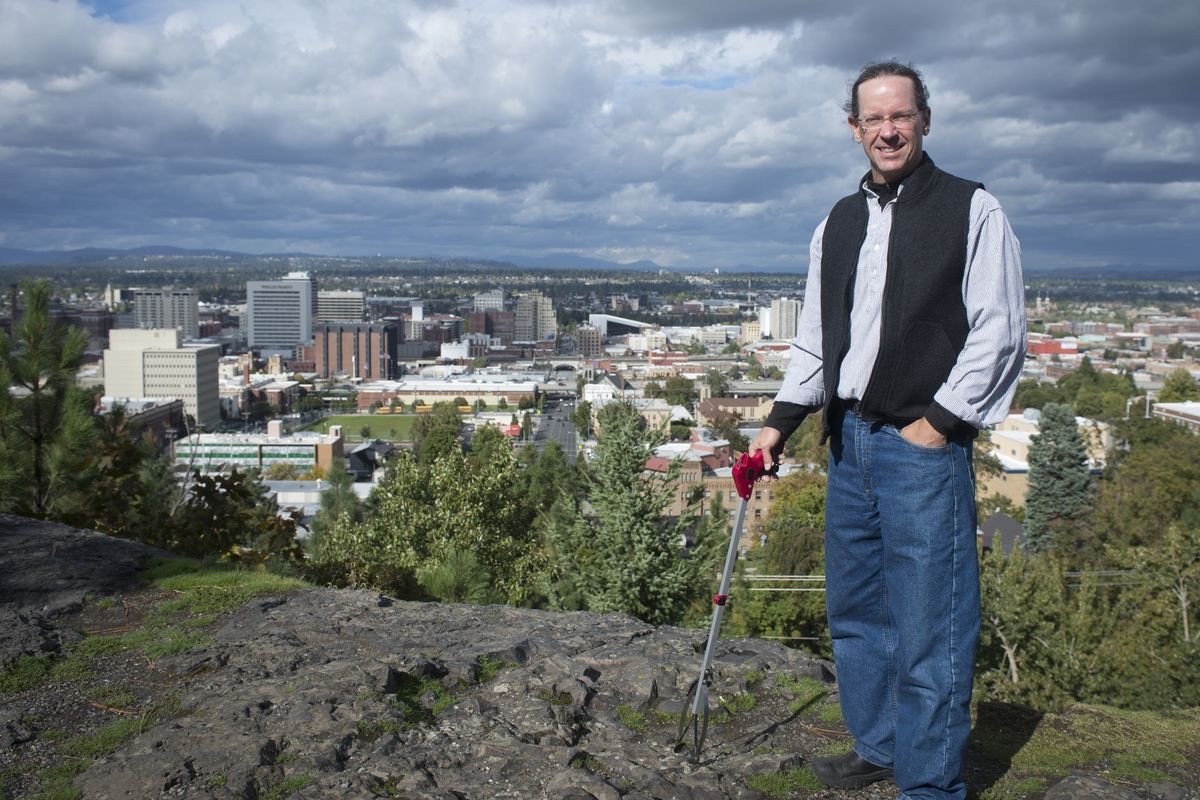Vestal: Littered hillside challenges its lone protector

The overlook on Cliff Drive offers one of the best views of Spokane – a panorama that sweeps from the twin spires of St. Aloysius to the twin pipes of the Steam Plant and outward.
Couples pose there for engagement photos. Limos haul revelers past for a nighttime glimpse of city lights. TV news trucks hoist their antennae there for live shots.
But if you walk to the basalt lip of the cliff and look down, it’s an uglier view. Bottles and cans and cups and boxes fan down the steep, brushy hillside. A no-parking sign lies there, not far from the shattered housing of a boxy television set. Broken glass crunches underfoot with nearly every step.
On the overlook itself, cigarette butts and glass proliferate along the ground like bishop’s weed. The trash was such that when David R. Thompson decided to launch a one-man cleanup experiment, he had to think small to think big.
“When I started, I was overwhelmed,” he said. “I had to pick out one square yard, and just pick up everything in that square yard.”
The overlook at Cliff and Stevens is part of Edwidge Woldson Park; it has long been a favorite viewing spot as well as a magnet for trash and crowds. Years ago, the city placed boulders along the road in an attempt to block parkers and trash dumpers, and Park Operations Manager Tony Madunich said the boulders improved the drive immensely.
Still, the no-parking rules have been difficult to enforce and the area impossible to keep clean, especially in the hard-to-reach spots below the cliffs, which are steep and brushy between the base of the basalt and South Stevens Street.
Since June, Thompson has taken on the problem as a personal experiment – a “rebellion toward giving in to the indifference that accumulated the mess,” as he wrote in a summary of his efforts. It began when he simply wanted to clean up the area below Cliff Drive where he likes to go bouldering, west of the overlook; he found the detritus of homeless camping. When he took that garbage to the trash can at the overlook, he noticed all the other mess on the ground there.
“Then I noticed, when I looked over the edge, that it’s almost a garbage dump down there,” he said.
Thompson, a problem-resolution consultant who lives on the South Hill, was “between contracts” and had some time, so he began visiting the overlook almost daily. For a couple of hours at a time, using his “little pincher thing,” he picked up butts and bottle caps. He also says he’s encountered dozens of pull-off can tabs – as evidence of the age of the problem he’s battling.
He says he once met a Parks Department employee there, who told him that the city had decided it could not practically keep up with cigarette butts at the overlook. Thompson asked the worker if the city would haul away the shopping carts that had been thrown off the overlook, and the worker agreed. Thompson has since dragged two of the three shopping carts up to be discarded.
“I hope to bring up the third grocery cart when I feel inspired,” he wrote.
Inspiration and curiosity play a large role in Thompson’s project. He began the cleanup in part to examine his sense that it was a “radical” act to do so – to simply decide to clean up part of his community, to risk caring about a problem that would resist solution and might leave him angry and frustrated.
He spends time at the overlook at night – when it is often packed with cars and young people drinking from the cans and bottles of cheap beer that will eventually litter the hillside below. The no-parking signs go unheeded. Lots of people just come up for the view and a moment of relaxation, but there are also a certain number of “transactional kinds of things moving between cars,” that could be drug- or prostitution-related, he said.
All right across the street from some of the swankest homes in town, walled in with hedges and greenery. Right at the vantage point of one of the prettiest views in town.
Thompson says he avoids frustration by trying to remain curious about what’s going on there. He says it’s a struggle, but that he finds the most value in his project when he lets go of being judgmental toward the litterers and tries to approach it with a curiosity, with an appreciation for the contemplation he can find in focusing on a small, attainable piece of the problem.
When Thompson cleans up those square yards at the overlook, they don’t stay clean. Not at all. The cigarette butts reappear. The cans and glass and beer cases respawn. Again and again, Thompson fills the single, battered metal garbage can, which is chained to a tree to prevent its being thrown over the edge. He’s not sure how long he’ll keep it up. He thinks it’s getting better, though he’s hesitant to take credit.
“It does seem like it’s slowed down some,” he said.